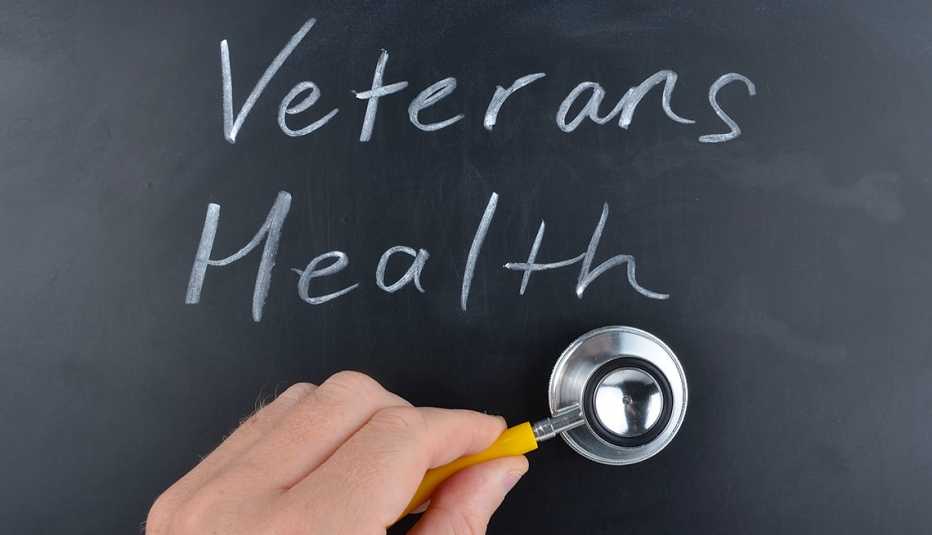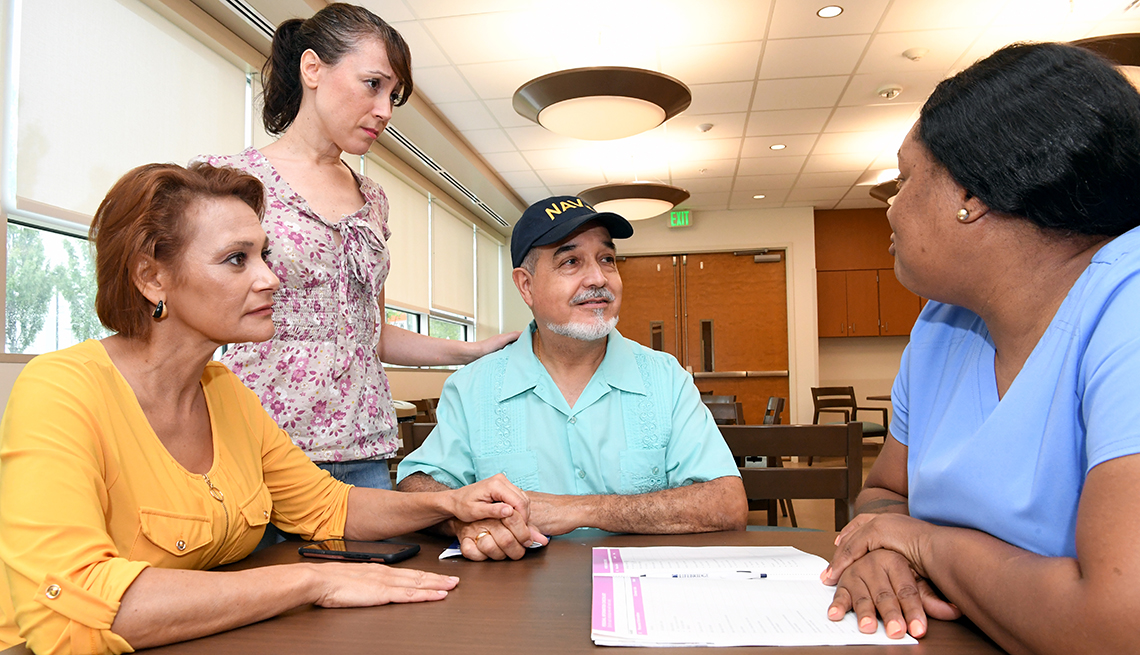AARP Hearing Center
Qualifying for health benefits can be complex, but understanding the process can provide better outcomes.
This navigator can help you to:
- Learn more about health benefits provided through the United States Department of Veterans Affairs (VA) and Department of Defense (DoD).
- Understand how to apply for VA or other federal health care programs.
- Identify how to get free help from certified representatives who have experience and knowledge of the VA’s process for awarding benefits.
Important Tips:
- Be persistent. Criteria for these programs are frequently revised, so eligibility for certain benefits may change. Ask questions and seek out help.
- Gather and organize the veteran’s information. The VA requires physical documentation to determine the benefits a service member is qualified for.
- Stay engaged after submitting initial applications to VA and other programs. No one wants to restart the application process for missing a deadline.
You may access a printer-friendly version of this guide here.
Intro to Benefits
What are VA benefits?
The government provides a number of services to help veterans in civilian life. Although not all VA benefits are related to health, service members who experience specific hardships or disabilities as a result of their service may be eligible for specialized health benefits which can sometimes include extra assistance for their caregivers, depending on the severity of their situation.
- Veterans who served in active uniformed service and didn’t receive a dishonorable discharge may qualify for benefits from the VA.
- VA benefits, and the level of help they can provide, often change because the VA receives different sums of money from Congress each year.
It's important to note that, in most cases, VA health services are only provided to the Veteran and not their spouse or family.
What health benefits are available?
Depending on age, household size, income and/or disability status, veterans and dependents may qualify for all, any or none of these:
- VA, DoD, or other government health care benefits.
- Private or other insurance administered through the Affordable Care Act (ACA).
- Medicare, free or low-cost Medicaid or the Children’s Health Insurance Program (CHIP).
Other forms of health care coverage (ACA or another private insurance plan, Medicare, Medicaid, or TRICARE), can be used in addition to VA healthcare benefits.
- Having any other health insurance coverage doesn’t affect the VA health care benefits you can get.
- Medicaid provides health care coverage to millions of Americans, including eligible low-income adults, children, pregnant women, elderly adults in long-term care and people with disabilities. VA income-based eligibility may also be related to Medicaid criteria.
New PACT Act Benefits


In what is being described as one of the largest VA benefit expansions in the history of the U.S., the PACT Act provides additional benefits and health services to more than 5 million Vietnam, Gulf War, post-9/11 eligible veterans. Visit va.gov/PACT to learn more.
Additional Toxic Exposure and Illness Health Coverage, Treatment and Patient Outreach
- Every enrolled veteran will receive an initial toxic exposure screening and a follow-up screening at least every five years. Veterans not currently enrolled but who are eligible will have an opportunity to e receive the screening.
- 20 more illnesses are now eligible for disability benefits as a result of exposure to burn pits and other toxins: meaning veterans will not have to prove that their service caused their condition(s).
This can help the paperwork required and need for a disability exam before being granted access to health care and compensation. The list includes 11 respiratory related conditions and several forms of cancer.
What does this mean for Vietnam era veterans?
- New presumptive conditions for Agent Orange include high blood pressure and monoclonal gammopathy of undetermined significance.
- Veterans who served at an additional five locations are now assumed to have been exposed to Agent Orange if they served during specified dates.
- Veterans who were a part of response efforts in three locations are now assumed to have been exposed to radiation if they served during specific dates.
Impact on Gulf War and Post-9/11 Veterans
- Newly considered presumptive conditions and cancers include brain, glioblastoma, kidney, melanoma, neck and pancreatic cancers, along with any type of cancer that is gastrointestinal, head-related, lymphatic, lymphoma, reproductive and respiratory.
- Other conditions presumed to be service connected include: Asthma diagnosed after service; chronic bronchitis, COPD, rhinitis, sinusitis; constrictive or obliterative bronchiolitis; and emphysema.
- Post-9/11 veterans who served in Afghanistan, Djibouti, Egypt, Jordan, Lebanon, Syria, Uzbekistan, Yemen — and any airspace above these locations – are presumed to have been exposed to burn pit toxins.
- Gulf War and post-9/11 era veterans who served in these locations are presumed to have been exposed to burn pits: Bahrain, Iraq, Kuwait, Oman, Qatar, Saudi Arabia, Somalia, the UAE — and any airspace above these countries.
VA Health Care Enrollment Period Expanded
- Post 9/11 and combat veterans may enroll within 10 years of their discharge date instead of five. For other veterans, a one-year open enrollment period is available to join VA healthcare without having to demonstrate a service-connected disability.
- Veterans discharged before October 1, 2013: those who meet the requirements listed below can apply and receive care during a year-long special enrollment period beginning October 1, 2022.
Veterans must have been active-duty during a theater of combat operations that include:
- A period of war or an operation after the Persian Gulf War, or
- Combat service against a hostile force after November 11, 1998.
And both of these must be true:
- A veteran must have been discharged or released between September 11, 2001, and October 1, 2013, and
- Has not enrolled in VA health care before.
VA encourages eligible veterans to apply during the 1-year period to receive any urgent care they might need now or in the future. Enrollment is free and VA health care may be free, too.
What is Available to Military Families?
- Family members of veterans who died due to one of these conditions may also be eligible for survivors benefits, including dependency and indemnity compensation.
- A one-time accrued benefits payment
- Health care through the Civilian Health and Medical Program of the Department of Veterans Affairs (CHAMPVA)
- A burial allowance for help with funeral or burial costs for qualifying spouses, partners or children. Visit aarp.org/vetsburialbenefits to learn more.
How to file a claim online
- Claims can be filed online, by mail, in person or with the help of a trained professional from a Veteran Service Organization.
- Claims for conditions that were denied in the past but are now considered presumptive should be filed through a supplemental claim.
- Full details and eligibility information related to the PACT Act can be found at va.gov/PACT, by calling 800-MyVA411 (698-2411) or by visiting a Veterans Benefits Administration (VBA) regional office.
VA Specialty Programs


Accessing Veterans Specialty Care Programs and Services
What is a specialty care program or service?
The VA recognizes that to address a number of unique situations, many veterans and their families need specialized programs and services, such as:
- Women Veterans Health Care Program
- Specialty Emotional and Mental Health Services
- Specialty Dental, Oral, Hearing and Vision Services
- Family Caregiver Assistance Program
These programs and services require specific qualifications based on circumstances that are laid out by legislation or regulations established by the VA.
Information on qualifying for and using these specialty care programs and services is provided below.
Women Veterans Health Care Program
The VA recently established a Center for Women Veterans to monitor and coordinate VA's administration of health care, benefits, services, and programs for women veterans. This includes:
- Comprehensive primary care
- Military exposures
- General health and cancer screenings, such as breast, cervical, colon and other specialty services for women
- Gynecologic and fertility treatments
- Sensory aids and prosthetics, including gender-specific items, such as those used after a mastectomy
- Other specialties, including radiology, neurology, cardiology, orthopedics, rheumatology, oncology and endocrinology
The Women Veterans Call Center (WVCC) is available at 1-855-829-6636 to get help or obtain specific assistance from trained women representatives regarding the VA.
Specialty Emotional and Mental Health Services
VA Health covers physical as well as emotional and mental health care. This includes a range of services, such as checkups, home health care, and mental health care services for post-traumatic stress disorder (PTSD), psychological effects of military sexual trauma (MST), depression, grief, anxiety and many other conditions.
The VA is concerned about addressing the risk of suicide among those who have served in the military and has services available for all veterans regardless of if they are enrolled in VA health care.
If you are a veteran in mental health crisis, are thinking about hurting yourself, or if you know a veteran in this situation, you can get help right away:
- Call 988, press 1, or text 838255 — you don't have to be enrolled in VA to connect.
Veterans may also call 1-877-927-8387 to talk with a fellow combat veteran about their experiences or concerns, 24 hours a day, seven days a week, 365 days a year.
How to qualify for VA Mental Health Care:
If you have a VA primary care provider, tell them any concerns you have. Your provider can help if you have PTSD or another condition and help you develop a plan.
If you don’t have a VA primary care provider or have never been seen in a VA hospital or clinic, contact the VA in one of these ways:
- Call the general information hotline at 1-800-827-1000, Monday through Friday, 8 a.m. to 9 p.m. ET
- Contact a local VA medical center.
Specialty Dental, Oral, Hearing and Vision Services
The VA offers comprehensive dental, oral, hearing and vision care benefits for qualifying veterans.
Hearing and vision challenges can stem from many service-connected disabilities.
Additionally, VA dental or oral care can provide a wide range of treatment from cancers to oral and facial surgery resulting from military service.
While there are exceptions, the most effective way to qualify for any of these specialty care services is to apply for VA Health Care as shown in other sections of this Navigator.
If you are not eligible for specialized services, veterans enrolled in VA Health may purchase specialty insurance through the VA, such as dental insurance at a reduced cost. Veterans who have recently served on active duty may be entitled to a one-time free dental care visit.
For more information about eligibility for the VA’s specialty dental and medical benefits, call 1-877-222-VETS (8387) or click here.
Family Caregivers Assistance Program
This VA program provides educational services, monetary assistance and other benefits to qualifying veteran family caregivers. Eligibility is determined if the caregiver(s) and the veteran meet certain requirements.
The family caregiver must be at least 18 years old and either be:
- A spouse, son, daughter, parent, stepfamily member or extended family member of the veteran, or
- Someone who lives full-time with the veteran and/or is willing to do so if designated as a family caregiver.
The veteran also must meet certain qualifications:
- Have a VA disability rating of 70% or higher that was made worse during specific periods of active duty (as described by the VA) and
- Prove at least six months of continuous in-person personal-care services is required.
To apply, both the veteran and the caregiver(s) need to sign and date an application and answer questions about their circumstances.
Applications can be submitted online, by mail or in person at a VA Medical Center (Caregiver Support Coordinator).
Additional information on qualifications and program details are available by clicking here, or by calling the VA at 1-855-260-3274.
Steps to Obtaining VA Health Benefits
Three Steps to Getting VA Health Benefits
- Identify if a service member is eligible for VA health services (see next section).
- Ensure you have the necessary documents.
- If you need help, reach out to certified VSO's, state or country veteran representatives.
How to Determine Which VA Benefits Are Available
Veterans qualify for health benefits in these ways:
- Service-connection: Having a disability from an injury or illness incurred during or because of military service.
- Special circumstance: Recipients of a Purple Heart or Medal of Honor, prisoners of war or served in certain geographic locations.
- Low income: Those with an income below a certain dollar amount determined by the VA.
Disability-Related Benefits
How to Qualify for Disability-Related Benefits
Disabilities come in two forms:
- Physical conditions like a chronic illness or injury.
- Mental health conditions like PTSD, that developed before, during or after service.
If you have a disability, you may also qualify for disability compensation: monthly tax-free payments based off your condition.
To qualify, both of the following must be true:
- Served at least 180 days of active duty, active duty for training, or inactive duty training.
- Have an illness or injury that affects your body or mind.
AND at least ONE of the following must be true:
- In-service disability: A sickness or injury that occurred while serving and linked to current condition.
- Preservice disability: An illness or injury before joining the military that was made worse from serving.
- Post-service disability: A disability related to active duty that didn’t appear until after service ended.
If you are already receiving disability pay, it should be easier to also obtain health benefits
Special Circumstance Benefits
How to Qualify for Benefits in a Special Circumstance
An additional way to secure benefits can be through a special circumstance such as:
- Prisoner of War (POW)
- Received Purple Heart
- Received Medal of Honor
- Served in Vietnam between 1962 and 1975
- Served in Southwest Asia/Gulf War between 1990 and 1998
- Served at least 30 days at Camp Lejeune between 1953 and 1987
Family members may qualify for health care benefits if they lived at Camp Lejeune as well.




































































